Multivitamins are the most common dietary supplement consumed in the U.S. and are regularly taken by at least one-third of all American adults.
Traditionally, a daily multivitamin is meant to prevent nutritional deficiency – and the combination of essential vitamins and minerals in these supplements is designed to resemble healthy dietary patterns, including regular fruit and vegetable consumption.
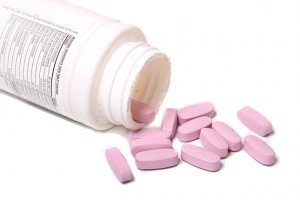
Multivitamins are supposed to provide the vitamins and minerals that would be obtained from healthy consumption of fruit and vegetables
Unfortunately, the official view of the mainstream medical establishment is that multivitamins do very little good. For instance, the 2010 Dietary Guidelines for Americans bluntly states that: “For the general, healthy population, there is no evidence to support a recommendation for the use of multivitamin/mineral supplements in the primary prevention of chronic disease.”
Further, a State-of-the-Science conference sponsored by the National Institutes of Health (NIH) also concluded that present evidence is insufficient to recommend either for or against the use of [multivitamins] to prevent chronic disease.
These are surprising statements, especially considering that such evidence does exist – and in the public domain, too.
Are these so-called “experts” unaware of studies that show clear benefits of multivitamin supplements for chronic disease, and in particular, cancer prevention… or are they deliberately misleading us?
Interestingly, in a 2009 online survey, 900 physicians and 277 nurses were asked whether they used dietary supplements and whether or not they recommend dietary supplements to their patients. The “Life…supplemented” Healthcare Professionals Impact Study (HCP Impact Study) reported that 51% of physicians and 59% of nurses reported that they themselves used dietary supplements regularly.

The HCP Impact Study revealed that 51% of doctors and 59% of nurses use dietary supplements regularly themselves and 79% and 82% respectively recommend them to patients
The most common reason they gave for using dietary supplements? To maintain their overall health and wellness, of course.
When asked whether they recommend dietary supplements to their patients, 79% of physicians and 82% of nurses said they did. So clearly these health professionals believe that supplements work.
The Research Shows a Different Story
Dr. Andrew Saul is the Orthomolecular Medicine News Service editor, with over 35 years of experience in natural health education. In 2006, he was named by Psychology Today as one of seven “natural health pioneers.”
As a proven expert, Dr. Saul differs from the establishment view that multivitamin supplementation has no effect on cancer risk and prevalence. In his view, there are a number of peer-reviewed studies that show strong correlations between supplements and reduced risk of various cancers.
One example is the Physicians’ Health Study II (PHS II), which looked at the effects of taking a common daily multivitamin supplement on overall cancer risk in over 14,000 male American physicians. The study clearly showed that multivitamin supplementation reduced overall cancer risk.
Similarly, a systematic review of 35 independent observational studies found that higher levels of 25-hydroxyvitamin D in the blood significantly reduced the risk of colorectal cancer. [Note: The 25-hydroxy vitamin D test is the most accurate measure of vitamin D in the body.]
Yet another study, carried out in 2011, shows that gamma-tocotrienol, a cofactor found in natural vitamin E preparations, reduces prostate tumor formation by an incredible 75%!
And there’s more…
But before we examine these studies in detail, let’s first understand how fruit and vegetable consumption impacts cancer risk today. After all, produce has been the traditional source of health-giving vitamins and minerals in our diet for centuries—well before supplements entered the picture.
Do Fruits and Vegetables Lower Cancer Risk?
Many studies have shown that higher consumption of fruits and vegetables is associated with a significantly lower risk of dying from all causes. For instance, a 2014 meta-analysis of six prospective cohort studies showed that each daily increment of one serving of fruits and vegetables lowered the risk of dying up to a threshold of five servings.
[Note: A “meta-analysis” uses a statistical approach to combine the results from multiple studies to increase statistical “power” relative to individual studies, improve estimates of the size of the effect, and/or to resolve uncertainty when reports disagree. A “prospective study” watches a so-called “cohort” of subjects over a fixed period and waits for specific outcomes, such as the development of a disease – and tries to relate this to other factors, such as suspected risk or protection factors.]
So, what are the effects of fruits and vegetable consumption on cancer risk?
To answer this question, another prospective study looked at the relationship between consumption of total fruits, total vegetables, and total fruits and vegetables combined, relative to cancer risk in the European Prospective Investigation into Cancer and Nutrition (EPIC) cohort.
Both increased intake of total fruits and vegetables combined and total vegetables reduced cancer risk in the 142,605 men and 335,873 women included in the study. Overall, this study showed a small but clear and significant association between intake of total fruits and vegetables and lowered cancer risk.
On the other hand, other studies have not always shown this relationship. For instance, a Swedish study in a large group of women did not find any connection between “fruit and vegetable intake” and overall cancer incidence.
Yet another study looked at the relationship between fruits and vegetable consumption and cancer incidence and deaths in two cohorts. Nearly 72,000 female participants in the Nurses’ Health Study and nearly 38,000 male participants in the Health Professionals’ Follow-up Study were asked to fill in food-frequency questionnaires.

It’s commonsense that regular consumption of organic produce is good for our health, so why do some studies not reflect this?
The study results showed that total fruits and vegetable intake (five servings daily) was associated with a lower risk of cardiovascular disease, but not with lower overall risk of cancer incidence.
So what’s going on?
We know for a fact that regular consumption of fresh, organic produce is good for our overall health and wellbeing. So why do some studies show benefits for cancer risk, while others don’t? There could be many possible reasons for this. Let’s take a closer look…
Fruits and Vegetables May Not Lower the Risk of Every Cancer
According to the National Cancer Institute (NCI), cancer is the name given to a massive collection of related diseases. The only common feature in all types of cancer is that some of the body’s cells begin to divide in a disorderly way without stopping and may eventually spread into surrounding tissues.
Other than that, there are huge differences between different cancers in terms of what sets them off, how and where they grow, and whether or not they migrate to other parts of the body (known as metastasis). Further, differences in your genetics, environment, and lifestyle all affect your individual predisposition to developing cancer and how a tumor may grow inside your body.
For instance, one person may develop lung cancer as a result of years of heavy smoking, while another may not. A third person may get lung cancer because of an entirely different reason. For example, working in an unsafe environment with cancer-triggering chemicals.

Chemotherapy kills cancer cells… and healthy cells along with them
Since no two cancers and cancer risks are alike, it’s not really possible to group many people together (each with their own specific type of cancer risk) and detect an effect of a therapy, unless the effect is so strong that it cuts across all forms of cancer.
For instance, some very powerful drugs used in chemotherapy and radiation therapy do kill different types of cancer cells – but they also destroy normal tissue at the same time and are incredibly toxic for the body.
Consumption of fruits and vegetables is much subtler and clearly does not affect the risk of getting all forms of cancer equally. Instead, consuming them may preferentially lower the risk of some types of cancer over others.
Of course, eating freshly grown fruits and vegetables that have not been treated with pesticides or herbicides is safe for your body… unlike many powerful but very toxic cancer therapies.
Is the Level of Nutrition in Today’s Fruits and Vegetables Sufficient?
Today, most people buy their food instead of growing their own. This has spawned a massive food industry where, for the most part, the health and wellbeing of the end-consumer (that’s you and me), are considered secondary to profits.
This makes no sense at all, since our health and wellbeing are intricately tied to our diet. In essence, we are what we eat.
Many people these days are also prescribed various drugs and treatments by their MD when they fall ill. There’s a growing school of thought that this only further complicates the problem. That the poor quality of nutrition in today’s foods (including produce), lies at the root of all our health problems and should be addressed first.

Average nutrient levels in crops have been falling steadily since the USDA first started measuring them
For instance, we assume spinach has a certain amount of beneficial iron in it. However, unless the soil the spinach was grown in had sufficient iron, this is simply no longer true. The fact that spinach had iron in it when levels were measured way back in the 60s doesn’t mean that the spinach you’re buying today has the same levels of iron.
In fact, data from the U.S. Department of Agriculture (USDA) clearly shows that average nutrient levels in U.S. crops have been steadily falling since they were first documented just over 80 years ago.
Not only that, you can’t be sure that you’re buying a typical bunch of spinach. Your bunch may have iron levels corresponding to the USDA data, or it might be less. As an end consumer of the present-day food industry, you can no longer state with any certainty that you can and do get all your nutrients from food. More than likely, you have
no idea what’s in your food and what’s not.
Of course if your food is made with raw ingredients and is unprocessed, you can dramatically improve the nutritive quality of your diet.

Unless you’re growing your own organic food in quality soil or sourcing it from a trustworthy farmer, there’s no way to ensure you’re getting all the nutrients you need from your diet alone
Many studies carried out on lab and farm animals given corn, soy, wheat, oats, and other crops grown in soils of different mineral levels clearly show that growth rate, vigor, and functional intelligence declined, while susceptibility to various diseases increased in animals fed crops grown in depleted soils, relative to more balanced soils.
This makes intuitive sense. The nutritive value of the fruits and vegetables we eat has a direct impact on our personal health and wellbeing and helps to determine our susceptibility to various diseases – including cancer.
The sad fact is… unless you’re growing your own food or sourcing it directly from a farmer you can trust, you simply can’t be sure of getting all the nutrients you need from your diet alone.
Enter multivitamin supplements. Let’s see what credible, peer-reviewed scientific studies have to say about their role in cancer risk.
Multivitamins and Cancer: The Physicians’ Health Study II (PHS II)
This clinical trial represents the only large-scale, randomized, double-blind, controlled study testing the long-term effects of multivitamin supplementation for the prevention of multiple chronic diseases.
[Note: A “randomized controlled” trial aims to reduce selection bias when testing a new treatment. Participants in the trial are randomly allocated to either receive the treatment in question or a control treatment known as the “placebo.” A “double-blind” clinical study is one in which neither the patients, nor the study researchers, nor those who analyze the results, know which participants have been subjected to which procedure – the idea being to ensure objectivity in the final analysis.]
In this study, researchers looked at the effects of multivitamin use on total as well as so-called “site-specific cancers,” including prostate and colorectal cancer. Simultaneously, they also looked at the effects on cardiovascular events, eye disease, and cognitive decline, the results of which are being published separately.
A total of 14,641 male U.S. physicians aged 50 years or older (including 1,312 men with a history of cancer at randomization) enrolled in this study starting in 1997.
During the follow-up period of 11 years, 2669 men developed confirmed cancer, including 1373 cases of prostate cancer and 210 cases of colorectal cancer. Compared with the control group, men taking a daily multivitamin had a statistically significant reduction in the incidence of total cancer.
However, there was no significant effect on the incidence of prostate cancer, colorectal cancer, or other site-specific cancers. Further, there was no significant difference in the risk of death due to cancer between the multivitamin-treated and control groups.
However, the fact remains… in this large prevention trial of over 14,000 male physicians, daily multivitamin supplementation modestly but significantly reduced the risk of getting total cancer.
The Link Between Vitamin B and Reduced Lung Cancer Risk
High blood levels of vitamin B6, folic acid (vitamin B9), and the amino acid methionine are associated with reduced lung cancer risk. In fact, people with high levels of these three nutrients had a significantly lower risk of lung cancer, whether they had ever smoked or not!
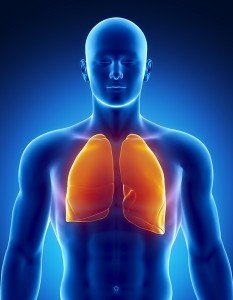
High blood levels of vitamin B6, folic acid (vitamin B9), and methionine are associated with a lower risk of lung cancer
Both B vitamins and methionine help to maintain the integrity of the all-important DNA in our body’s cells. This may be how they affect lung cancer risk.
For this study, the European Prospective Investigation into Cancer and Nutrition (EPIC) recruited over 500,000 participants from 10 countries and measured their blood levels for four B vitamins – B2, B6, B9, and B12 – as well as for methionine and homocysteine.
Within the entire EPIC cohort, people with higher blood levels of vitamin B6, vitamin B9, and methionine showed an incredible 50% lower risk for lung cancer – and these results were seen in people who had never smoked, were former smokers, as well as in current smokers.
The Impact of Vitamin D on Colorectal and Breast Cancer
Previous epidemiological studies have suggested that low or insufficient blood levels of vitamin D can increase the risk of getting several cancers; presumably, raising blood levels would reverse this effect.
To examine this possibility, a systematic review carried out in 2009 identified 35 observational studies that looked at blood levels of 25- hydroxyvitamin D relative to the risk of colorectal, breast and prostate cancer, and colonic adenoma.

In postmenopausal women with breast cancer, those with higher blood levels of vitamin D survived longer
These study researchers found that the higher the levels of blood 25-hydroxyvitamin D, the lower the risk of developing colorectal cancer. However, no such association was found for breast and prostate cancer in this review.
On the other hand, it has been shown that in women diagnosed with breast cancer, those who have higher levels of blood 25-hydroxy vitamin D survive longer. While women with lower vitamin D have higher mortality rates.
Indeed, a prospective cohort study in Germany with nearly 1,300 postmenopausal breast cancer patients clearly showed that lower blood levels of 25-hydroxy vitamin D were associated with poorer overall survival and a higher risk of death.
Intravenous Vitamin C (IVC) Reduces Tumor Size in Advanced Cancers
You can tell that oncologist Victor Marcial-Vega, MD, likes a challenge. During a talk in 2010 at the Medical Sciences Campus in the University of Puerto Rico, he explained how he and his team had specifically sought out patients with advanced, “incurable” Stage IV cancers.
Of these, 40 patients received 40,000-75,000 mg of vitamin C intravenously several times a week, along with a special diet and other supplements. Incredibly, 75% of these patients achieved an initial tumor response rate, defined as a 50% or more reduction in tumor size!
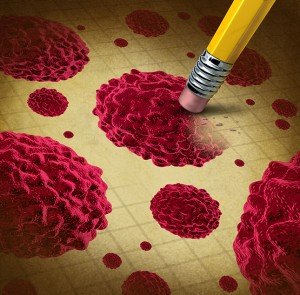
In a study of 40 patients with stage IV cancer, 75% achieved a reduction in tumor size after receiving intravenous vitamin C several times a week
The Riordan intravenous vitamin C (IVC) protocol – now of great interest for its potential use in adjunctive cancer care – involves the slow infusion of vitamin C at high doses. IVC use has recently become very popular among integrative and orthomolecular medicine practitioners.
Vitamin C was first suggested as a tool for cancer treatment in the 50s, when its role in collagen production and protection led to the hypothesis that its replenishment would protect normal tissues from tumor invasiveness and metastasis.
Also, since cancer patients are often vitamin C deficient, replenishment may improve immune system function and enhance health and wellbeing in cancer patients. Up to a four-fold survival time has been observed in terminal cancer patients treated with IVC.
There are many valid reasons for using IVC to treat cancer:
#1. High blood levels of vitamin C can safely be achieved with IVC infusions.
#2. At high levels, vitamin C is preferentially toxic to cancer cells and is able to prevent the formation of new blood vessels that feed tumors and help them to grow.
#3. Vitamin C can accumulate in tumors, with significant tumor growth inhibition.
#4. Published case studies report that IVC has anti-cancer efficacy, improves patient wellbeing, and lowers markers of inflammation and tumor growth.
#5. Phase I clinical studies indicate that IVC can be administered safely, with relatively few adverse effects.
Vitamin E and Lung Cancer
According to a recent report on NBC News, “Vitamin E does no good at all in preventing cancer or heart disease.”
Must be they never saw (or bothered to look for) this and other similar studies.
In an ongoing study of 1,088 lung cancer cases and 1,414 healthy matched controls, researchers studied the associations between consumption of alpha-, beta-, gamma-, and delta-tocopherol in the diet relative to lung cancer risk. [Note: Tocopherols are a class of organic chemical compounds, many of which have vitamin E activity.]
Increasing intake of dietary alpha-tocopherol (300 IU vitamin E per day) was seen to lead to between a 34-53% reduction in lung cancer risk.
Natural Vitamin E Factor and Cancer
Gamma-tocotrienols, one of the natural constituent compounds of vitamin E, have been shown to act against a wide range of human cancers. For instance, not only do they prevent prostate cancer cell invasion, but they also sensitize prostate cancer cells to other anti-cancer drugs.
A 2008 study showed that tocotrienols are able to induce apoptosis and cell cycle arrest in human prostate cancer cells, suggesting a potential role for them in prevention of prostate cancer. In fact, this natural vitamin E factor leads to a staggering 75% reduction in prostate tumor formation!
In a 2011 study, gamma-tocotrienols were seen to target prostate cancer stem cells, which may account for their anti-cancer actions. Other studies have shown that tocotrienols are powerful growth inhibitors and inducers of apoptosis (“programmed cell suicide”) in human breast cancer cells.
Why Vitamin Quality is Critical
Contrary to the view espoused by government health agencies, vitamins are very good for our health and wellbeing. As we’ve covered in this article, there are many peer-reviewed studies that show strong correlations between regular consumption of multivitamin supplements and reduced risk of various cancers.
No, we’re not claiming that any single multivitamin supplement will cure cancer. Let’s be clear: supplements do not cure cancer. Food does not cure cancer. But clean, organic, non-GMO food can provide the body the raw materials (i.e. fuel) that it needs to heal itself. That is the where true healing/ curing takes place. It’s the body that heals!
In the words of my good buddy, Robert Scott Bell, “the power to heal is yours!” And much in the same manner that food can provide fuel to the body to facilitate healing, so can properly manufactured supplements.
That being said, not all supplements are created equally. Believe it or not, many vitamins that are marketed as “natural” in your local grocery store are actually synthetic, and to call a synthesized vitamin “natural” is an oxymoron. Natural vitamins are made by God. They’re not “created”(synthesized) from something by experts in laboratories, with various components being isolated from other essential components. The fact of the matter is that isolated, synthetic nutrients are not found anywhere in nature.
We all know that whole foods (like fresh vegetables, raw honey, and brown rice) are more nutritious than refined foods (like vegetable chips, white sugar, and white rice). I think everyone would agree on that fact. I mean, that’s a “no brainer.” So why should it be any different for vitamins and minerals and supplements? The reality is that synthesized supplements are not nearly as beneficial for the body as whole-food-based supplements.
Much like refined foods, synthesized supplements have oftentimes been robbed of nutrients, act more like “drugs” or “xenobiotics” (foreign substances) in your body than supplements (because they are isolated), and can actually create imbalances if taken for long periods of time.
Whereas whole-food-based supplements are exactly what their name suggests: supplements made from concentrated whole foods. The vitamins are not isolated, but actually a synergy of enzymes, coenzymes, trace elements, antioxidants, and other factors all working in harmony to provide your body with the fuel that it needs to stay healthy.
If you go to a junkyard, you can certainly find all the “parts” that are needed to build an automobile (tires, a steering wheel, an engine, shock absorbers, an axle, windshield wipers, seats, headlights, etc). However, if you throw all these isolated parts into a big pile, you can’t expect a BMW to emerge, can you? I mean, we all know that an automobile, in its original form, will perform better than a heaping pile of individual parts.
The same analogy applies to vitamins and minerals that have been isolated. We cannot isolate nutrients from the whole complex and then expect them to do the same job as the whole complex is designed to do. In other words, they are parts of an entire synergistic complex that serve a good purpose when they are part of the whole. But they will not provide the fuel that your body needs unless they are part of a well-orchestrated “nutritional symphony.”
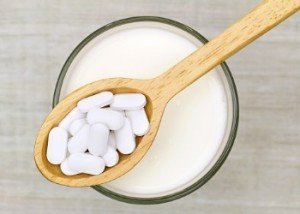
Without these “cofactors,” the body’s tissue literally chokes on the calcium, sort of like filling an engine with gasoline but forgetting to give it oxygen. Gag! Choke! Flooded engine. In the case of calcium, without the co-factors, it gets deposited in tissue (known as “calcification”) and is one of the signs of aging. Eventually it can cause premature death. Quite literally, we turn to stone.
But what happens if we mix a little air with the gasoline? Boom!… The engine ignites! Similarly, if we mix in zinc, vitamin D, magnesium, silicon, boron, and protein with the calcium, then the body understands what’s going on, the cells turn on, and the body begins to function at optimal levels.
Although many supplement makers try to cram as many isolated components as possible into a capsule, telling us that “the more the better,” the reality is that synthesized components can actually create imbalances in the body. What we need is bioavailable, synergistic, nutrient complexes only found in whole-food-based supplements.
Editor’s Note: This article was initially published in 2018 and has been updated in 2024.
Article Summary
The opinion of the mainstream medical establishment is that multivitamins do very little good.
Studies clearly showed that multivitamin supplementation reduced overall cancer risk.
Total fruit and vegetable intake was associated with a lower risk of cardiovascular disease.
Nutrient levels in U.S. crops have been steadily falling.
As an end consumer of the present-day food industry, you can no longer state with any certainty that you can and do get all your nutrients from food.
Men taking a daily multivitamin have a statistically significant reduction in the incidence of total cancer.
We need bioavailable, synergistic, nutrient complexes only found in whole-food-based supplements.










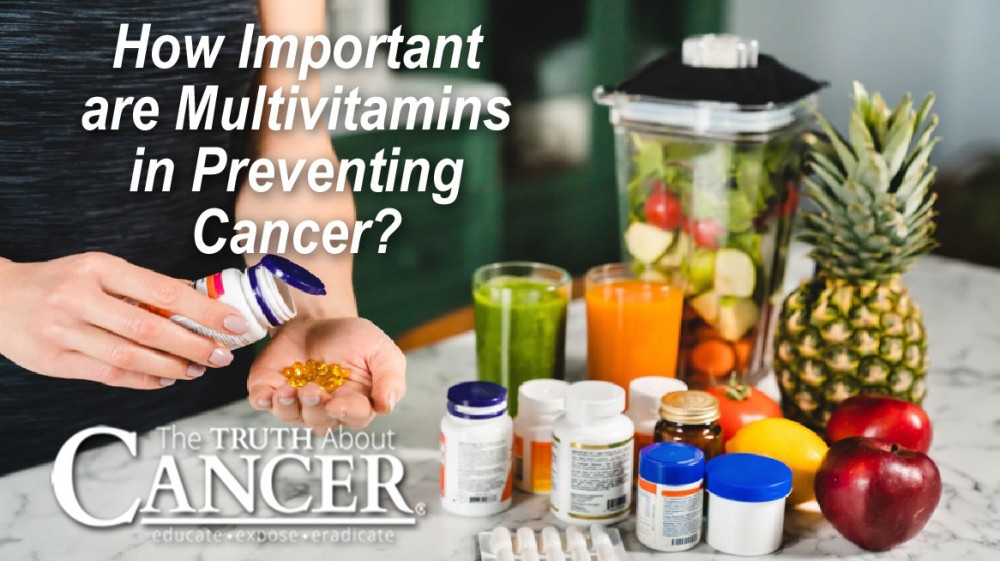








great information … I trying must be replaced with doing … understanding and believing that cancer can be controlled and removed from this body … I have new spots in my neck … working hard to understand … I changed what I eat .. need to do more … I an asking for help to guide me thru this process … not going to do Chemo again .. it’s that simple my friend
Keith
father
Combat-vet Iraq
Tai Ji teacher/teacher
chrisbeatcancer.com
excellent resource!!
Best wishes…….thank you for serving!
Dr. David Brownstein- books on IODINE. Cured my fibricystic breasts! Would today be called pre-cancer if I’d not found him! Read, read, read, Dr Jonathan V. Wright, Dr. Mercola, Dr. Group, Dr. Carolyn Dean, if you want to live! All Natural medicine Drs!!
Many doctors did not get much training on nutrition or supplements – maybe a few classes – but months or years for prescribed pharmaceuticals . So most doctors are leery in advising patients on supplementation because most are not FDA approved except for a few like folic acid or Vitamin D2 which is not as effective as D3. On the other hand The German E commission has extensive research on vitamins and minerals and can be prescribed before medications are given such as CoQ10 before statins milk thistle for liver repair and so on. I take Vitamin D3- magnesium- multi vitamin- probiotics and have achieved better overall health as a result. I now have 2 doctors checking vitamin d3 levels on more patients because of my success with them. Regulating them would help but the cost to comply would put many independent manufacturers of supplements out of business which defeats the purpose. Which supplements are better than other’s is anyone’s guess but I will continue to take which works for me Take care!
I cannot say I have read everything so far said, word to word, but I read Ty’s first book and have followed newsletters and enough of TTAC articles to say that I totally agree with Ty’s mission and he and his colleagues are doing a fantastic job to set people on the right path with their mission. I wish him and his team all the best and I hope that all people who care about their life style and their health benefit from his teams invaluable work. This is long overdue.
Thank you for your compliment and for being with us Zita!
A recommendation for a quality multivitamin for men, women and kids would be awesome after the info that was presented!
Do you have a recommended brand?
I would like to know which multi-vitamin you recommend.
Thank you!
What vitamin brand is recommended . Thanks so much! Donna
Excellent article Ty. I do take a calcium,magnesium and vitamin D regularly,but do I need to take some of the other things mentioned,such as boron. I was diagnosed with type 2 diabetes in June 17 and was put straight onto metforman. Now my blood sugar levels are down to low sixes but don’t seem to be able to get it any lower without starving myself. I am eighty one years old so live a fairly sedentary lifestyle.I do also have protein shakes at least once a day. Should I be taking any other vitamins.
I’m sorry to just make a comment here but i noticed you said you drink protein shakes, I’ve been made aware that most of those ones that are geared toward the older, generation especially Ensure are not actually healthy and are really sugar drinks with vitamins added (and it’s made by a company that produces pharmaceuticals, makes sense now). The first four ingredients are: water, sugar, corn syrup, and milk protein concentrate. Essentially, it’s sugar water & approximately 23 grams of sugar (more than you should consume in an entire day). I hope you are able to find a good alternative, unless you want to just drink it as you enjoy it regardless.
Thanks for your good information that does not try to trick the reader to “watch to the end” for some sales pitch. I feel that you are a source we can trust.
I am looking for someone to do a similar meta-analysis on the misguided and misused treatments for mental illness. The first I heard of any interest was Dr. Humphrey Osmond many years ago, but then decades of absence on the subject followed. Now there is much material in the public view, but mostly superficial and so prevalent that it takes a lifetime to discern what part of it is worthy of further investigation and possible use. I will continue to learn from you, and I know where to refer folks in immediate need and where to turn should I have to make quick health decisions on the “cancer spectrum.”
Get the Book by Dr. Mark Starr, “Hypothyroidism Type 2, The Epidemic” Mental issues galore are caused by a poor working Thyroid! Too many chemicals and goitrogens interfere with it working properly. Halides like Bromide, Chloride, Fluoride all push out the one halide you need! IODINE/IODIDE! Mental issues include (but not all ppl have all) Hoarding, very Low Self esteem, Bulimia, Anorexia, Cutting, Bo-Polar, (there is only one Type! You either are or you’re Not), Narcissistic, Scewed self Image, Depression (1st atage) Bi-polar (2nd stage) Phycosis (3rd stage- when most suicides occur) then last stage Schizophrenia.
Where does one find food-based vitamins? Brand names?The article stops short of this crucial information. And, since the majority of research is done with “synthetic” vitamins, how can one compare the results with them with results from food-based vitamins? Is there research using food-based vitamins? Long ago I saw a label on a food-based multi-vitamin. The milligram amounts for the nutrients in the bottle were substantially lower than the amounts for the same nutrients in “synthetic” vitamins. I had trouble believing that such low amounts–of even something “natural” would have therapeutic benefits. In contrast, Life Extension publishes research about various nutrients, sometimes up to 120 medical studies on a nutrient, after reviewing the nutrient in their article. These are all, by and large, “synthetic” and yet they get solid results for conditions such as heart disease, high blood sugar, dementia, chronic diseases of various kinds.
Hi David,
We cannot recommend a specific type of supplements at this time. Here’s a great article if you want to learn more about multivitamins: https://thetruthaboutcancer.com/multivitamin-supplement/
YOU have to learn your nutrients. Sorry, there’s no short cut here. But I find Swansonvitamins and Vitacost both have many brands, good quality , bioavailable, but YOU have to read the labels and make your decision. For more teaching and learning I highly recommend Joel Wallach( Dead Doctors Don’t Lie, Somebody Needs to go to Jail, Immortality, Dead Athletes Don’t Lie, Epigenetics and that will get you started on his educational videos. He lists the nutrients in most of his books including the 60 minerals. ) Also look up John Bergman, an excellent teacher of physiology and how the body adapts to damage. Also Eric Berg who explains these things also but in shorter videos. Joseph Mercola has a huge archive of various subjects at Mercola dot com. Soilminerals for com explains the roles of trace Minerals in plant health and vitamin production. Westonaprice dot org also has important articles on the nutrients and why saturated animal fats are better for us than polyunsaturates. There are others , selfhacked, etc. But this is a good foundation for some exciting learning.
Juice Plus is a company that produces whole foods in a capsule. You get your doctor recommended servings of fruit and veggies a day taking there product. Personal experience, it does a wonderful job.
As a degreed holistic nutritionist who has studied this topic extensively, I also recommend Juice Plus+. The research studies on JP+ are very impressive so I would encourage readers to check it out…
I would like to know recommended brands as well. Thanks
Hi David,
We cannot recommend a specific type of supplements at this time. Here’s a great article if you want to learn more about multivitamins: https://thetruthaboutcancer.com/multivitamin-supplement/
Try True Hope vitamins for depression and other mental heath issues. Lots of research to crack it up and if you buy the vitamins from them, they will walk you through on what to do on the phone.
A good rule of thumb, whatever the criminals in the Medical Mafia say, do the exact opposite. They peddle nothing but pain, misery and death for profit.
Thank you for the information. I would like to bring something to your attention that is quite new to me and perhaps to a lot of people, that may be of importance.
My father has been taking vitamins, because we are told that we need to as we do not get enough vitamines, minerals etc. from our daily food.
Somehow (it’s a long story) he found a doctor who first takes blood to analyse all the values of the vitamines and minerals and so forth to create a full health picture up to organ and cellular level.
Once he got the results he was advised amongst other things, to stop taking vitamine B 6 immediately, because he is overdosing himself, Which could result into nerve system failure.
My sister (also a long story) took the same test and found out that, although she lives very healthy, her health is bad up to cellular level. Her body needs first to be ‘detoxted’ before any vitamine or mineral can do what it is supposed to do.
These stories are much bigger with a lot more information but this makes me think that:
taking vitamines and minerals is very helpfull, if you know what kind and how much of it a body needs.
Very interesting. In my country Germany multivitamins are almost unknown. If you see on any food package ” plus Vitamin xxx”, people will not buy it as they think there is something artificial added. I am interested whether the level of cancer deaths in Italy, Greece and Japan, where multivitamins are not used, is the same or higher than in the US. It is convincing however that multivitamins of a natural kind have got a positive effect in lowering the level of cancer development when the general vegetables are not as healthy as they once were.
However I think that regular fasting and taking very hot baths (which create some kind of fever) have got a much higher positive effect in preventing cancer. So kindly initiate a double blind research test to find out the situation. Thanks.
Dear Ty and Charlene,
I originally watched your free documentary series which was emailed. I missed a couple of episodes and bought the DVDs. They are life-changing, really. I wanted to support your mission so I have loaned them to various people and gave the free online version to my doctor, where I felt the message may have the widest impact.
Since then, I have been reading your newsletters and forwarding them to others. I have discovered that, even among my work colleagues and people at the gym where I go, there are many people touched by cancer who have no real, organised alternative to the current medical model. To realise that they and their families are facing their illness and awful treatment options in quiet despair is saddening, and makes me want to help them too.
Thank you so much for sharing your personal story and for the information that is helping so many people.
You are both doing a fantastic job, bringing hope and healing to those who are suffering and for others, who will hopefully be able to prevent it.
With my very best regards,
Therese
Please let us know multivitamins you suggest for men women and kids…how do you feel about Ritual vitamins for women?
Hi Lori,
We cannot recommend a specific type of supplements at this time. Here’s a great article if you want to learn more about multivitamins: https://thetruthaboutcancer.com/multivitamin-supplement/
What’s a good brand of vitamin c
What multivitamin do you recommend?
Hi Vicki,
We cannot recommend a specific brand at this time. For more information about multivitamins, please see this article: https://thetruthaboutcancer.com/multivitamin-supplement/
I will read the rest of the article later, but in the section about Fruits and Vegetables, a claim was made that makes me question the reliability of the information.
“…studies showed that each daily increment of one serving of fruits and vegetables lowered the risk of dying, up to a threshold of five servings.”
Sorry, but there is no way anyone can reduce the risk of dying (in general)….we are all 100% going to die. Perhaps this should have read ‘dying from cancer’?
I often wonder if the vitamins I order do anything because when I order them it usually takes at least
3 days to get. When the temperatures are in the 90’s and than they sit in a hot mailbox for hours, they are actually warm when I receive them. Do most vitamin manufacturers use heat to form these
pills? Would vitamins be better delivered on ice? Or am I making a mountain out of a molehilll?
cancer is like a new ghost in millenial time….
a lot of information about herbal which said have an effective cure to cancer but the problem is the dosage. I Have a friend who believe that leaves of sirsat (Annona muricata) can effectively decrease the cancer symptoms and also give a healthy effect to his body ……so he rise the dosage from 10 leaves to 20 leaves….finally he suffered himself.
thanks for your opportunity to join this group
sulis
Finding a whole food vitamin that stands up to its claims, that is safe, chemical free, etc… AND affordable. Where do you even begin?
Hi Mary,
We do not have a specific brand that we recommend at this time. If you want more information about multivitamins, here’s a great article: https://thetruthaboutcancer.com/multivitamin-supplement/
Thank you Ty and Charlene for educating the masses to lifestyle options to treating cancer.
I have lived a plant based life since Thanksgiving 1974. In December 2016, I was diagnosed with Mantle Cell, Non-Hodgkins Lymphoma. This is a relatively rare cancer with a very grave diagnosis.
I had over 1 dozen cancerous tumors that were anywhere from golf ball to softball sized throughout my body. I decided to use an integrative approach to my therapy using medical procedures complimented with nutrition and supplementation. I eat only organic, non-gmo, gluten-free, and dairy free foods.
After taking supplements for over 40 years and using more brands than I can count, I now only use USANA supplements. They are formulated to work with the cellular functions of the human body and are the highest rated supplements on the market. The company was founded by a microbiologist and immunologist with over 80 scientists on staff.
My tumors are now mostly gone. My cancer is currently under control, and I am starting to get back to a relatively normal life. I have far exceeded even the best expectations of my doctors.
I am a living miracle who is only alive because I believed that through education, nutrition, supplementation, exercise, and a strong belief system I could survive this journey.
I don’t know if i’m allowed to mention a brand here, but if not i’m sure they will take this down. Naturelo:: Whole Food Multivitamin for women and one for men. non GMO, no soy, no gluten, vegan, no coloring, no preservatives, no flavorings, made in USA. these are made from 100% whole foods. I have been taking these for almost 1 year, and notice the difference. The fake vitamins on the market was making me sick.
Do you have recommendations for “whole food” supplements?
Hi LaVeta –
Good question!
Unfortunately, we don’t have a specific brand recommendation for supplements at this time. But I would be happy to pass along this question/request on your behalf.
In the meantime, you could start with doing some research on USDA certified organic supplements available in a local shop or an online store. 🙂
Dr. Axe has a wealth of free educational articles and resources on his website right here: https://tinyurl.com/TTACANshop
You can use the search function to find more information on any topic! You may also find it helpful to “Shop Health Interest.”
If you have any further questions/concerns, please let us know as we are happy to help.
Blessings and love!
Good useful relevant accurate information Ty & Charlene.
Youre doing a wonderful job.. Bless you.
Keep up the good work.
I’ve understood quite a bit about the body over the last 15 years.. and vitamins and supplements are exactly what the body needs. Many herbal & plant substances also do a wonderful job….
Forget the Big Pharma & FDA mafia GAS !!. Don’t waste your time listening to them.
There’s meditation, frequency based healing, and much more.. incl belief.. to actual healing.
That’s what I’ve Come to understand – & believe. And even Greg Bradden’s work & videos point to these same truths.
As do Eastern & other healing traditions all t over the world.
Just …do not despair..
Seek and you shall find..
There are many good people who band together & help humanity. Even Mike Adams of Natural News hosts many of them from time to time..
The thing to understand is – good people stick together, and share insights and support each other.. as a community of like minded souls.
Lots of love..
Hi Ty & Charlene;
I may have mentioned this to you before. I have been taking mega doses of all of the vitamins since 1975. I suffered for years with bad hay fever & allergies, since I was a child. When I started taking them, within a few months, all of my allergies went away, for good! It’s been 44 years now.
I figured this out long before the medical profession even recognized, or believed this concept.
Thanks.
Keith Saari.
One thing not mentioned is that if we were to get all our nutrients from food, if they are grown in Round Up contaminated soil or dessicated by Round Up ( that would be most conventionally farmed grains, seeds and beans), these soil will be extra deficient in minerals and beneficial bacteria by the very action of Round Up to bind multiple minerals. Crops NEED minerals to MAKE the vitamins for our use. No minerals, no vitamins. Example selenium deficient soils will be vitamin E deficient. I know this syndrome well in floppy kid syndrome or white muscle disease. In humans it’s known as muscular dystrophy. Joel Wallach made this discovery as he was researching NASA monkeys and found Se deficiency caused cystic fibrosis. He was blackmailed out of the research industry for not sticking to the story that it was genetic.
In the 1940’s the USDA recorded on a map that American farmsoils were 40% deficient in necessary minerals. In 1992 or so Joel Wallach recorded that these soils were now up to 85% deficient. With widespread use of Round Up I would love to see the latest stats.
Hi whisperingsage –
Thanks for your comment. Indeed – Round-Up taints the food it touches. This is why we encourage people to eat non-GMO, organic, farm-grown, and/or home-grown wherever possible.
Thank you for sharing this info!
Blessings and love!
When we buy fruits and vegetables from a supermarket, we do not know exactly where it came from. People might had sprayed pesticides, herbicides, and insecticides which are definitely harmful to our health.